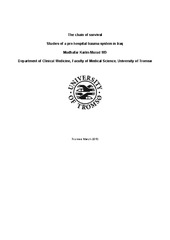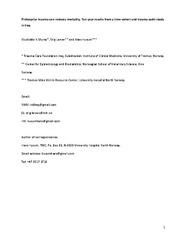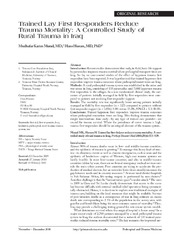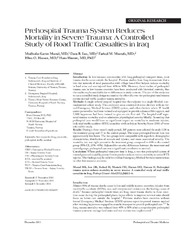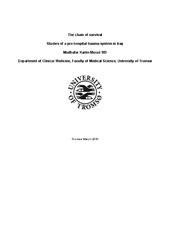| dc.contributor.advisor | Husum, Hans | |
| dc.contributor.author | Murad, Mudhafar Karim | |
| dc.date.accessioned | 2013-10-04T08:55:33Z | |
| dc.date.available | 2013-10-04T08:55:33Z | |
| dc.date.issued | 2013-09-06 | |
| dc.description.abstract | Most trauma deaths in war occur outside hospital, in the mine fields and on the way to hospital. To improve survival, a prehospital trauma system was set up in 1997 by the PhD candidate with trauma experts from UNN in the minefields of North Iraq. The model worked well and reduced death rates from 40% to 10%. The model was further refined and adapted to manage highway traffic casualties, and in 2003 also to support the communities caught in the war zones in Central Iraq. A three-tier rescue system of lay first helpers, trained in-field paramedics, and professional Emergency Room care providers had a significant impact on survival, especially in severely injured patients. The studies document for the first time that trained first helpers at grassroots level improves survival where out-of hospital times are long. | en |
| dc.description.doctoraltype | ph.d. | en |
| dc.description.popularabstract | What makes a survivor? Studies from minefields and war zones in Iraq.
The thesis presents the results of studies conducted from 1997 to 2006 in the mine fields and war zones in Iraq. Life-saving rescue systems were set up and the author aims to identify the key factors for survival.
In August 2013 dr. Mudhafar Karim Murad, MD, will defend his PhD thesis “The chain of survival; studies of prehospital trauma system in Iraq” at the Faculty of Health Science, University of Tromso.
There is a worldwide epidemic of trauma going on. Each year 5.8 million of people die from injury and millions are more become disabled. This epidemic of injuries is accelerating and it is out of control. The situation is strikingly unjust; conflicts, land mines, and natural disasters target communities that also suffer from starvation, endemic diseases, embargo and war. The quality of most trauma scenarios in the poor countries differ from the Western countries. Therefore it is urgent to develop rescue system models, which fit low-resource settings. For this, war-torn Iraq is a challenging testing ground.
Most trauma deaths in war occur outside hospital, in the mine fields and on the way to hospital. To improve survival, a prehospital trauma system was set up in 1997 by the PhD candidate with trauma experts from UNN in the minefields of North Iraq. The model worked well and reduced death rates from 40% to 10%. The model was further refined and adapted to manage highway traffic casualties, and in 2003 also to support the communities caught in the war zones in Central Iraq. A three-tier rescue system of lay first helpers, trained in-field paramedics, and professional Emergency Room care providers had a significant impact on survival, especially in severely injured patients. The studies document for the first time that trained first helpers at grassroots level improves survival where out-of hospital times are long.
The candidate, Mudhafar Karim Murad, d.o.b. January 12, 1969 obtained his MBCHB from the Medical College, University of Mosul in 1993. Mudhafar is Kurd and during his study period he was dismissed from the university as he refused to go to war against his fellow folks in Iran. Since 1997 he has used days and nights to try to help his country to get out of the depression caused by embargo and wars. His aim is to turn the tide of brain drain, and help rebuild Iraq as a developed country of high educational standard. | en |
| dc.identifier.uri | https://hdl.handle.net/10037/5440 | |
| dc.identifier.urn | URN:NBN:no-uit_munin_5140 | |
| dc.language.iso | eng | en |
| dc.publisher | University of Tromsø | en |
| dc.publisher | Universitetet i Tromsø | en |
| dc.rights.accessRights | openAccess | |
| dc.rights.holder | Copyright 2013 The Author(s) | |
| dc.rights.uri | https://creativecommons.org/licenses/by-nc-sa/3.0 | en_US |
| dc.rights | Attribution-NonCommercial-ShareAlike 3.0 Unported (CC BY-NC-SA 3.0) | en_US |
| dc.subject | VDP::Medical disciplines: 700::Clinical medical disciplines: 750 | en |
| dc.subject | VDP::Medisinske Fag: 700::Klinisk medisinske fag: 750 | en |
| dc.title | The Chain of Survival. Studies of a prehospital trauma system in Iraq | en |
| dc.type | Doctoral thesis | en |
| dc.type | Doktorgradsavhandling | en |


 English
English norsk
norsk